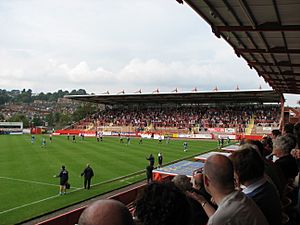St James Park (Exeter) facts for kids
|
The Park, SJP
|
|
 |
|
| Full name | St James Park |
|---|---|
| Capacity | 8,219 |
| Record attendance | 20,984 Football (Exeter City FC v. Sunderland A.F.C., 4 March 1931, FA Cup) |
| Field size | 104 x 64 metres |
| Surface | Grass |
| Construction | |
| Built | 1904 |
| Opened | 10 September 1904 |
| Tenants | |
| Exeter City Football Club (1904–present) | |
St James Park is a football stadium located in Exeter, England. It is the proud home ground of Exeter City FC, a professional football club. The stadium is super easy to get to, with its own train station, St James Park railway station, right next door! The club even helps take care of the station, painting its railings in Exeter's team colors: red and white.
After some big updates, St James Park can now hold 8,219 fans. Imagine this: the most people ever to watch a game here was 20,984! That happened in 1931 when Exeter played against Sunderland in an exciting FA Cup match.
Contents
Stadium Stands: Where Fans Cheer!
St James Park has different sections, called stands, where fans sit or stand to watch the games. For a while, some parts of the stadium were closed for construction. This was to make the stadium even better!
During the 2019–20 football season, something unique happened. Because of the COVID-19 pandemic, a big play-off game was played without any fans in the stadium. But Exeter City supporters found a creative way to be there! They sent in their photos, and a company made life-sized cardboard cutouts of them. These cutouts filled the stands, making it look like the fans were still cheering on their team!
Today, the stadium can officially hold 8,720 people. However, to make sure everyone is safe and comfortable, the number of fans allowed in for a game is usually 8,219.
Meet the Stands: Your Guide to St James Park
Here's a quick look at the main stands at St James Park:
| Stand Name | Who Sits/Stands Here? | How Many People? |
|---|---|---|
| Thatchers Big Bank | Home Fans (Exeter City supporters) | 3,960 (standing) |
| IP Office Stand | Home Fans & Away Fans (visiting team supporters) | 2,116 (seated) |
| Optimising IT Adam Stansfield Stand | Home Fans | 1,599 (seated) |
| Tracks Suzuki Away Stand | Away Fans | 1,045 (standing) |
St James Park: A Look Back in Time
The land where St James Park now stands has a really interesting past! Way back in 1654, it was owned by Lady Anne Clifford. She rented it out, and the money earned was used to help a poor child from the local area get an apprenticeship. For almost 250 years, pigs were kept on this land!
Before Exeter City FC, another team called Exeter United FC played here. When Exeter United joined with St. Sidwell's United to form Exeter City FC in 1904, they leased the land. The new agreement made sure that "no circuses or steam roundabouts" would be allowed on the property!
In the early days, some visiting teams complained that the pitch wasn't long enough. But in 1920, the club bought more land. This allowed them to make the pitch bigger and build the famous Big Bank stand.
In 1921, the club was able to buy the entire stadium site. This was thanks to money from selling a player named Dick Pym to Bolton. They then started making improvements, like adding a roof to the Cowshed stand. In 1926, they rebuilt the Grandstand after a fire.
Modern Updates and Challenges
In 1994, the club faced some money problems. The stadium was sold and later bought by Exeter City Council, who then leased it back to the club. By 1996, things were looking up, and the club began to update St James Park. They rebuilt the Big Bank stand in 2000 and replaced the Cowshed terrace with a new seating stand in 2001. Old school buildings next door were also turned into new offices and a social club.
More money troubles came up, but in 2003, the club's Supporters Trust took over running things. They worked hard to solve the financial issues.
In 2005, thanks to money from a big FA Cup match at Old Trafford the year before, the club was back on track! Fans even volunteered their time to help with small repairs and maintenance around the stadium.
In 2016, plans were approved for a major redevelopment of the Old Grandstand. This old stand, which was 90 years old, was taken down and replaced with a brand new stand that can seat 1,600 people. This project was funded by building new student homes behind the Big Bank. The new stand was named 'The Stagecoach Adam Stansfield Stand' in honor of a beloved player who sadly passed away in 2010.
International Matches at St James Park
St James Park isn't just for local games! It has also hosted international football matches.
On November 22, 2006, the England Women's Under 21s played against France in a friendly game here. The match ended in a 1-1 draw.
The stadium also hosted an England C international match against Wales on February 20, 2008. England won that exciting game 2-1!

